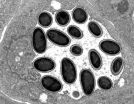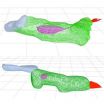Forced to be bad: When eating that chocolate cake is 'not our fault'?
2014-10-14
(Press-News.org) Imagine you're dining out with a friend who insists on sharing some chocolate cake for dessert. Since the decision has already been made for you, you gladly join in without feeling any regret. According to a new study in the Journal of Consumer Research, consumers are happier when someone else decides they can indulge in dessert or other guilty pleasures.
"Most of us don't like being forced to do things. The freedom to make our own decisions generally energizes us and increases our sense of well-being. However, when it comes to purchasing and consuming products normally associated with feelings of guilt, reducing someone's sense of free choice could ultimately boost their overall well-being," write authors Fangyuan Chen and Jaideep Sengupta (both Hong Kong University of Science and Technology).
In one study, a group of consumers was asked to read a book that was either entertaining or educational. These consumers were either able to choose the book themselves or simply given one of the two books. Consumers who read the educational book experienced equal levels of guilt, vitality, and creativity regardless of whether they had chosen or were given the book. However, consumers who were given the entertaining book experienced significantly less guilt and much higher vitality and creativity than those who had freely chosen the entertaining book.
Companies offering luxury products can use these results to help consumers deflect their spending decisions and feel better about splurging on expensive purchases. Meanwhile, businesses that sell indulgent products can help consumers enjoy their "guilty pleasures." Consumers will feel less guilt and enjoy themselves more if they don't feel responsible for an indulgence such as an unhealthy but delicious dessert.
"In an effort to avoid punishment, children will say someone else 'made them' break the rules. As it turns out, this evasion of responsibility also works surprisingly well for adults and may carry substantial benefits for consumers," the authors conclude.
INFORMATION:
Fangyuan Chen and Jaideep Sengupta. "Forced to Be Bad: The Positive Impact of Low-Autonomy Vice Consumption on Consumer Vitality." Journal of Consumer Research: December 2014.
For more information, contact Fangyuan Chen (fangyuan@ust.hk) or visit http://ejcr.org/.
ELSE PRESS RELEASES FROM THIS DATE:
2014-10-14
Consumers worldwide associate France with fashion and luxury and are willing to pay a lot for French luxury products such as perfume and wine. But what about products made in countries with less favorable reputations? A new study in the Journal of Consumer Research shows that consumers won't judge a country's products by its reputation if the products are well-made.
"Positive feelings about a country don't always translate into more favorable opinions of its products. A positive opinion of a country may actually make consumers think more about whether or not the country ...
2014-10-14
October 14, 2014 –Adolescents whose parents better understand their daily experiences have better psychological adjustment, suggests a study in the October issue of Psychosomatic Medicine: Journal of Biobehavioral Medicine, the official journal of the American Psychosomatic Society. The journal is published by Lippincott Williams & Wilkins, a part of Wolters Kluwer Health.
Having parents who understand how their day went may even affect teens' cellular responses to stress—providing a possible link to improved physical health as well. "These results provide ...
2014-10-14
It might not be obvious on the scales, but healthy eating and increased physical activity from walking during pregnancy is directly associated with a range of improved outcomes at birth, according to researchers from the University of Adelaide.
Results of the world's biggest study of its kind – offering healthy eating and exercise advice to pregnant women who are overweight or obese – are published today in two papers in the journal BMC Medicine.
"While it might have been expected that healthier eating and increased physical activity during pregnancy would ...
2014-10-14
A Rice University study of tamper-resistant voting methods revealed that only 58 percent of ballots were successfully cast across three voting systems. The researchers concluded additional work is needed to make voting both secure and user-friendly.
The study, "Usability of Voter Verifiable, End-to-End Voting Systems: Baseline Data for Helios, Prêt à Voter and Scantegrity II," examined three new end-to-end voting systems – systems that give voters the option to both verify the system is working properly and to check that their votes have been recorded ...
2014-10-14
Extreme adaptations of species often cause such significant changes that their evolutionary history is difficult to reconstruct. Zoologists at the University of Basel in Switzerland have now discovered a new parasite species that represents the missing link between fungi and an extreme group of parasites. Researches are now able to understand for the first time the evolution of these parasites, causing disease in humans and animals. The study has been published in the latest issue of the scientific journal Proceedings of the National Academy of Sciences (PNAS).
Parasites ...
2014-10-14
Putnam Valley, NY. (Oct. 13, 2014) – Two studies recently published in Cell Transplantation reveal that cell transplantation may be an effective treatment for spinal cord injury (SCI), a major cause of disability and paralysis with no current restorative therapies.
Using laboratory rats modeled with SCI, researchers in Spain found in laboratory tests on cells harvested from rats - specifically ependymal progenitor cells (epSPCs), multipotent stem cells found in adult tissues surrounding the ependymal canal of the spinal cord - responded to a variety of compounds ...
2014-10-14
The dirt in your backyard may hold the key to isolating cancerous tumors and to potential new treatments for a host of cancers.
University of Iowa researchers have found a gene in a soil-dwelling amoeba that functions similarly to the main tumor-fighting gene found in humans, called PTEN.
When healthy, PTEN suppresses tumor growth in humans. But the gene is prone to mutate, allowing cancerous cells to multiply and form tumors. PTEN mutations are believed to be involved in 40 percent of breast cancer cases, up to 70 percent of prostate cancer cases, and nearly half of ...
2014-10-14
This news release is available in German. In order to invade healthy tissue, tumor cells must leave the actual tumor and enter the bloodstream or lymphatic system. For this purpose, they use certain enzymes, proteases that break down the tissue surrounding the tumor, thus opening the way for tumor cells to reach blood or lymphatic vessels. To keep the proteases in check, the body produces inhibitors such as the protein TIMP-1, which thwart the proteases in their work.
But during development of metastases, the control function of this inhibitor appears not only to ...
2014-10-14
HOUSTON – (Oct. 13, 2014) – New research from Rice University's Baker Institute for Public Policy found that states with a large minority population tend to incarcerate more people.
According to lead author Katharine Neill, states with large African-American populations are more likely to have harsher incarceration practices, worse conditions of confinement and tougher policies toward juveniles compared with other states. She said these findings provide some support for long-standing arguments among sociology and criminal justice experts that the criminal ...
2014-10-14
Recently, uncertainty has been getting a bad rap. Hundreds of articles have been printed over the last few years about how uncertainty brings negative effects to the markets and creates a drag on the economy at large. But a new study appearing in the February 2015 edition of the Journal of Consumer Research finds that uncertainty can be motivating.
In "The Motivating-Uncertainty Effect: Uncertainty Increases Resource Investment in the Process of Reward Pursuit," Professors Ayelet Fishbach and Christopher K. Hsee of the University of Chicago Booth School of Business and ...
LAST 30 PRESS RELEASES:
[Press-News.org] Forced to be bad: When eating that chocolate cake is 'not our fault'?

